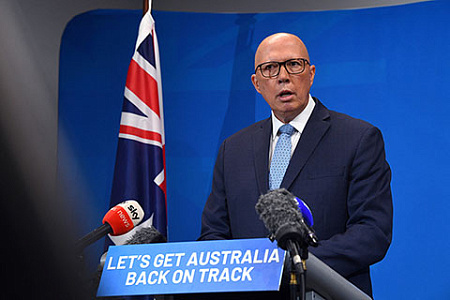
In Australia, the election campaign is nearing the finish line. The ruling Labor Party of Prime Minister Anthony Albanese and a coalition of the Liberal and National Parties led by former Defense Minister Peter Dutton are fighting for the majority of seats in parliament. Passions are running high, rivals accuse each other of mortal sins. And then Dutton used an old trick, telling about the Russian threat. It turns out that Moscow is soliciting Indonesia for the right to use the base for its military aircraft. Canberra was forced to seek clarification from Jakarta. Indonesia replied that such a request had not been received from the Russian Federation at all.
The example of Australia shows that when it comes to votes, all means are good. Dutton acted exactly in this spirit. The fact is that the analytical organization Janes, well-known among military experts, published information that Russia had officially requested permission from Jakarta to use the Indonesian Air Force base. Russian strategic bombers could land on it. The base is located on Biak Island, which is approximately 1,400 km away from the Australian port city of Darwin. The publication referred to by Dutton did not report that the request had been granted.
But this did not bother the opposition leader at all. At a press conference, he addressed the following question to the government: did the prime minister know about Russia’s request before Indonesian President Prabowo Subianto told about it? Further, Dutton said in an interview with TV channels that he had read comments about discussions between Russia and Indonesia. According to him, the fact that the government did not know about Russia’s request is a “catastrophic failure.” In turn, the journalists asked if Dutton had seen the Indonesian president’s statement that such discussions had indeed taken place. The politician replied that the information came from the presidential administration.
But President Prabowo Subianto himself did not say that. In the end, the head of the opposition had to admit that he had gleaned information from the publication of Jains. It was then that the government decided to take revenge in a verbal battle. Prime Minister Albanese said that, talking about the Russian military invasion of the region, the opposition leader shamelessly attributed words to the Indonesian president that he did not utter. There is no confirmation of the information disseminated by a well-known portal in military circles.
Following the head of government, Australian Defense Minister Richard Marles attacked the opposition leader. He called his colleague in Indonesia and recounted what he had heard: there is no prospect of Russian aircraft operating from Indonesian bases. “The reports are completely unreliable, Indonesia pursues an independent foreign policy. We do not allow foreign countries to have military bases in Indonesia,” Marles was told in Jakarta.
So, much ado about nothing? If you look at what is happening from a historical perspective, you will find a lot of interesting things. Strangely enough, anniversaries in our age of rapid technological progress play a significant role in world politics. Let us recall with what fanfare the United States and its partners celebrated last year the 80th anniversary of the Allied landings in Normandy during World War II. This year is also an anniversary year for Russian-Indonesian relations: 75 years ago, diplomatic relations were established between the Soviet Union and Indonesia. This was by no means a protocol event. At that time, Moscow, in confrontation with Washington, tried to win over the third world – the young liberated countries – to its side. A Soviet delegation led by Nikita Khrushchev, First Secretary of the Central Committee of the CPSU, visited Indonesia. The guests were warmly welcomed on the streets. Moscow managed to establish friendly relations with the then President of Indonesia, Ahmed Sukarno. At that time, the possibility of establishing close military ties between Moscow and Jakarta was also discussed.
And what is the situation today? In an interview with NG, Alexey Drugov, chief researcher at the Institute of China and Modern Asia of the Russian Academy of Sciences, noted: “Australia is an integral element of Western military–political blocs. Therefore, in Australia, Russia’s presence in the region is perceived as a threat. Although in fact there is no threat. Indonesia, being committed to the course of non-alignment, does not allow the deployment of military bases on its land to either the West or the East. However, Russia declares its desire to develop relations with Indonesia in the economic, cultural and healthcare spheres. Indonesia joined the BRICS association. This shows that such a desire is mutual. We are also talking about military-technical cooperation. This refers to the training of personnel for the Indonesian armed forces, possibly on the supply of weapons and new technologies. The Indonesian press positively assessed the fact that Moscow invited the country’s president to attend the Victory Day Parade in Moscow on May 9 and the St. Petersburg International Economic Forum.”
